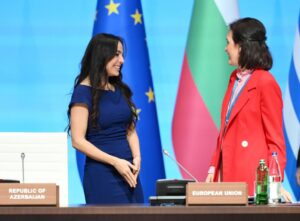Bulgarian Experts Call for Fiscal Prudence and Structural Reforms Ahead of Eurozone Entry

Sofia, The Gulf Observer: In a recent interview on Nova TV, prominent financier and former Bulgarian National Bank (BNB) Governing Board member Lyudmila Elkova, alongside economist Petya Georgieva from the Institute for Market Economics, offered a detailed assessment of Bulgaria’s economic trajectory in the context of its upcoming eurozone accession. The discussion centered on the country’s fiscal policy, public spending inefficiencies, and the institutional credibility required to meet the stringent criteria of euro area membership.
Lyudmila Elkova emphasized that joining the eurozone is not merely a procedural or technical undertaking—it is a process deeply rooted in institutional trust, policy coherence, and unwavering state commitment. She cautioned that Bulgaria must convincingly communicate its dedication to sound fiscal governance to both international investors and EU partners. Without this assurance, Elkova warned, Bulgaria risks facing elevated borrowing costs, which could adversely affect both businesses and households.
“The eurozone is more than a shared currency—it is a community grounded in responsibility and mutual confidence,” Elkova stated. She underscored the importance of sustained fiscal discipline, asserting that a credible commitment to prudent economic management is essential for long-term stability within the monetary union.
Economist Petya Georgieva turned the spotlight on Bulgaria’s internal budgetary challenges, arguing that the core issue lies not in the lack of financial resources but in the inefficiencies and misallocations within public spending. She criticized the current fiscal framework for failing to conduct rigorous impact assessments and for maintaining excessive, often redundant expenditures.
“Entering the eurozone with a bloated administration and persistent budget deficits would undermine Bulgaria’s credibility and violate the fiscal discipline expected of member states,” Georgieva asserted. She called for structural reforms that would streamline public administration and optimize resource allocation, positioning Bulgaria as a reliable and fiscally responsible partner in the eurozone.
Elkova further noted that fiscal responsibility must be a collective effort, requiring a concerted approach involving the government, parliament, and broader society. She emphasized the importance of institutional cooperation, political stability, and a majority in parliament committed to resisting populist pressures that may derail reform efforts.
Echoing this sentiment, Georgieva stressed the critical role of civic participation. She advocated for greater transparency and public accountability in budgetary processes, noting that effective oversight by citizens is vital to ensure responsible governance and the successful implementation of reforms.
“Without active public engagement and scrutiny, meaningful change will remain out of reach,” she warned.
As Bulgaria approaches a decisive phase in its eurozone ambitions, the insights shared by Elkova and Georgieva underscore the urgent need for institutional integrity, disciplined fiscal policy, and transparent governance to ensure a smooth and credible integration into the European monetary framework.


